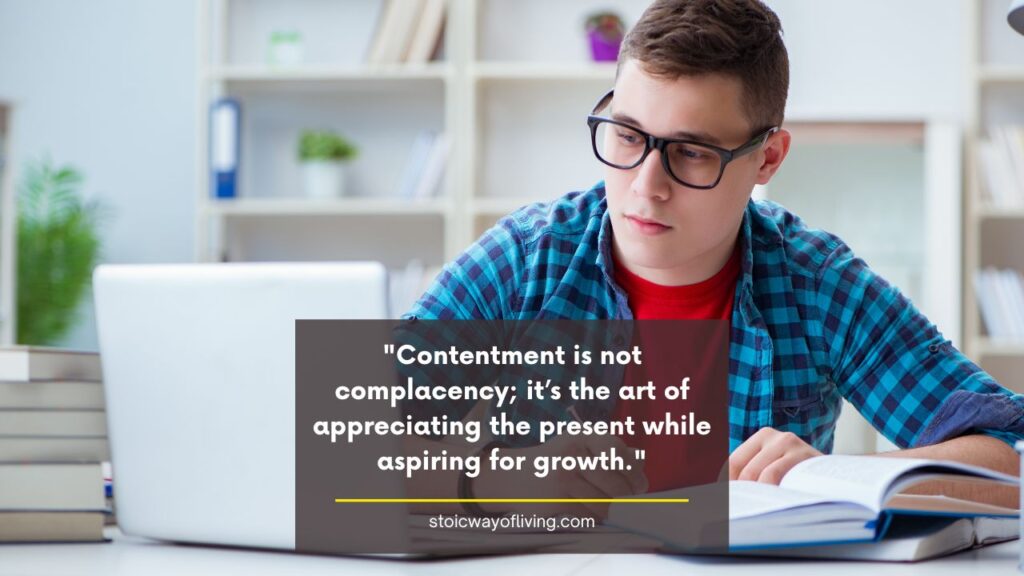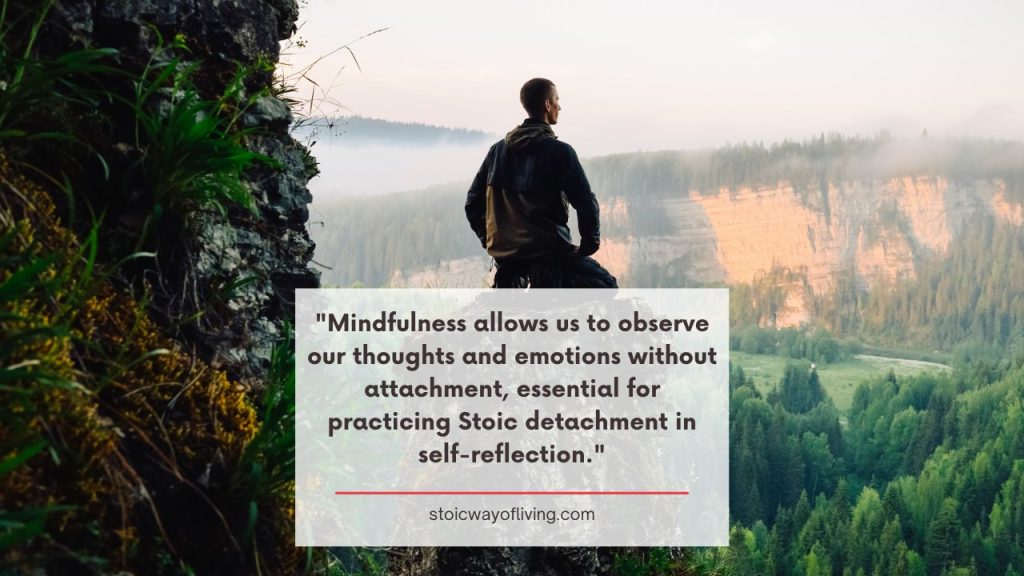Balancing ambition with contentment is a nuanced challenge that many individuals face. In our fast-paced world, the desire to achieve and excel often conflicts with the need for inner peace and satisfaction.
Understanding and applying Stoic principles allows us to cultivate a balanced life where ambition and contentment coexist.
This article will explore how Stoicism guides us in aligning our goals with our values, practicing gratitude, and focusing on what we can control.
Understanding Ambition through Stoic Eyes

In Stoic philosophy, ambition is not inherently harmful; it becomes problematic only when it leads to excessive attachment to external outcomes.
From a Stoic perspective, Ambition is about striving for excellence and personal growth.
Seneca, a renowned Stoic philosopher, emphasized the importance of striving for virtue rather than wealth or fame.
According to Seneca, true ambition should be directed towards developing one’s character and fulfilling one’s potential.
This involves setting high standards for oneself and working diligently towards self-improvement.
However, Stoicism warns against allowing ambition to dominate one’s life, leading to stress and dissatisfaction.
Instead, ambition should be tempered with wisdom, ensuring that our pursuits align with our core values and contribute to our overall well-being.
Embracing Contentment: The Stoic Way

Contentment in Stoicism is about finding peace and satisfaction in the present moment, regardless of external circumstances.
Epictetus, another prominent Stoic philosopher, taught that contentment arises from accepting what is within our control and letting go of what is not.
This principle, known as the dichotomy of power, is central to Stoic thought. We cultivate a sense of inner peace by focusing on our actions, attitudes, and responses.
Contentment is not about complacency but about recognizing the abundance in our lives and appreciating what we have. It involves practicing gratitude and finding joy in simple pleasures.
For the Stoics, true contentment is an inner state that remains unshaken by external events, allowing us to navigate life’s challenges with equanimity.
The Dichotomy: Ambition vs. Contentment in Stoicism

The perceived conflict between ambition and contentment is a common dilemma. Stoicism offers a unique perspective on resolving this dichotomy.
Marcus Aurelius, the Roman Emperor, and Stoic philosopher, emphasized the importance of balancing personal goals with acceptance of fate.
Aurelius believed that while striving to achieve our best, we must also be prepared to accept outcomes beyond our control.
This balance allows us to pursue our ambitions without becoming enslaved by them.
Real-life scenarios often illustrate this conflict: a professional striving for career success while seeking personal happiness or an athlete aiming for peak performance while maintaining mental well-being.
Stoic principles guide us in harmonizing these pursuits by focusing on what truly matters and maintaining a sense of detachment from external results.
Strategies for Balancing Ambition and Contentment: A Stoic Toolkit

Achieving a harmonious balance between ambition and contentment requires practical strategies rooted in Stoic philosophy.
Here are some actionable steps to help you navigate this balance effectively:
Identifying and Living by Personal Virtues
Begin by reflecting on the virtues that are most important to you.
As highlighted in Stoic teachings, these could include wisdom, courage, justice, and temperance.
Make a conscious effort to incorporate these virtues into your daily actions and decisions.
By aligning your goals and behaviors with your core values, you ensure that a solid ethical foundation guides your ambition.
Setting Goals Aligned with Stoic Values
When setting goals, ensure they resonate with your values and contribute to your well-being.
Instead of pursuing external markers of success like wealth or status, focus on goals that foster personal growth, meaningful relationships, and community contributions.
For instance, aim to develop new skills, deepen your knowledge, or volunteer for causes you care about.

Practicing Gratitude and Mindfulness Daily
Cultivate a habit of gratitude to enhance your sense of contentment.
Each day, take a few moments to reflect on and appreciate the positive aspects of your life.
This practice can shift your focus from what you lack to what you have, fostering a mindset of abundance.
Additionally, incorporate mindfulness exercises like meditation or deep breathing to stay present and centered. These can reduce stress and enhance your ability to savor the moment.
Focusing on What Is Within Your Control
A fundamental Stoic principle is the dichotomy of control, which involves distinguishing between what is within your power and what is not.
Concentrate your efforts on actions, attitudes, and responses you can influence, and let go of concerns about external outcomes.
This mindset helps you remain focused and composed, regardless of external circumstances, allowing you to pursue your ambitions with calm and determination.
Incorporating Reflection and Meditation into Daily Routines
Regular reflection and meditation can help you maintain clarity and perspective.
Set aside time daily to review your actions, intentions, and progress toward your goals.
Reflect on whether your pursuits align with your values and consider any adjustments needed.
Meditation practices, such as focusing on your breath or reciting Stoic maxims, can reinforce your commitment to living virtuously and maintaining balance.

Breaking Goals into Manageable Steps
Divide larger, ambitious goals into smaller, actionable tasks.
This approach makes your objectives more attainable and less overwhelming, allowing you to celebrate incremental successes.
Recognize and reward yourself for each milestone, reinforcing your motivation and sense of accomplishment.
Practicing Self-Compassion
Be kind to yourself, especially when facing setbacks or challenges. Understand that failure and obstacles are natural parts of the journey.
Use these experiences as opportunities for growth and learning rather than sources of self-criticism.
Embrace a mindset of resilience and perseverance, acknowledging your efforts and progress.
Embracing Intrinsic Motivation

Shift your focus from external rewards to intrinsic motivation.
Engage in activities you are passionate about, which will bring you joy and fulfillment.
Rather than merely striving for external validation or achievements, find meaning in the process.
This intrinsic motivation will sustain your ambition while nurturing a deep sense of contentment.
See also: Overcoming Workplace Challenges with Stoicism – All You Need to Know!
Conclusion
Balancing ambition with contentment is a complex yet achievable goal, mainly when guided by Stoic principles.
This balance allows us to pursue our goals without becoming consumed by them, fostering a fulfilling and meaningful life.
Remember, the key lies in focusing on what we can control, practicing gratitude, and aligning our actions with our core values.
For those seeking further guidance on finding balance in your life, I highly recommend the book “Finding Contentment in a Chaotic World” by Karen D. Nutter. This guide combines deep wisdom and practical exercises that can forever change your life. Check it out on Amazon and begin your journey towards lasting contentment.


